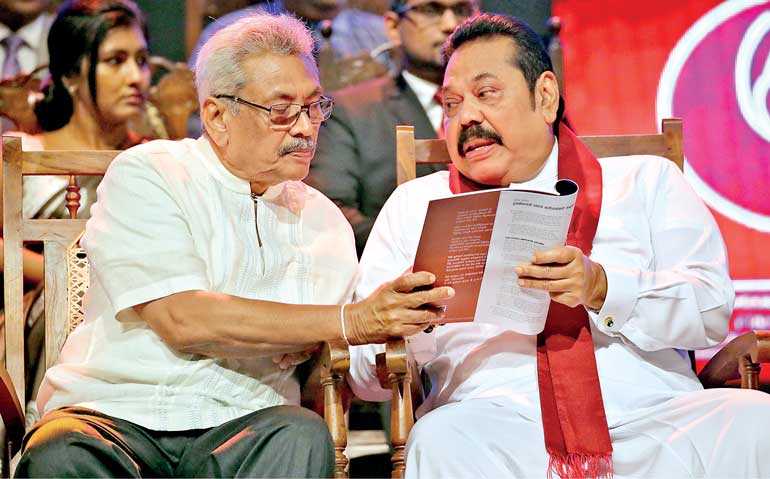Saturday Feb 14, 2026
Saturday Feb 14, 2026
Tuesday, 25 February 2020 00:00 - - {{hitsCtrl.values.hits}}

A president is not a king. Policies are too complicated for manifestos. Expertise and broad public and stakeholder consultation are needed for workable and effective policies. Parliament has real power and must work out finances with the President
Recently I was asked to speak on the technology aspects of the National Policy Framework, derived from the 2019 Presidential Election manifesto of the victorious candidate. In responding to questions, I realised that seminar-attending intellectuals in Colombo suffer from some basic misunderstandings about policy formulation and manifestos. If this is the case with the elite, what hope for the rest?
Policy formulation
Policies, strategies, plans and roadmaps are the basic instruments of policy. To use a term popularised during the Clinton presidency, they are the realm of policy wonks. They are intricate and prone to error because of the incompleteness of information and the possibility of unintended outcomes and interactions.
I will illustrate using a policy I promoted as Director General back in 1999. When addressing a meeting of secretaries convened by the Secretary of Treasury (ST), I was asked about SLT’s unresponsiveness to requests for new connections by Government organisations.
Thinking on my feet, I answered from basic principles. We have three licensed suppliers; you are not compelled to get connections from SLT, the formerly fully State-owned telecom supplier; do what the procurement rules tell you to do and call for competitive offers from all three. This resulted in a circular from ST ordering all Government organisations to competitively procure telecom services. 
SLT tariffs were regulated while those of the new entrants were unregulated until 2002. All Suntel and Lanka Bell had to do was to offer a price a few rupees below the known regulated price of SLT and they would win the business. One could argue that SLT still would not suffer much because habits die hard in Government and circulars are obeyed in the breach; that my intervention caused SLT to become more responsive as a result; and so on. But the fact is that the effects of an interaction between two well-intended policy elements had not been considered.
Good policy formulation involves consultation, ideally with direct stakeholders. One may decry this, saying it privileges the already powerful. But they are the ones who can help improve the quality of the information used in policy formulation.
The affordances of the Internet can open the process for others. I recall a letter out of the blue that I received in 1998-99 (the Telecom Regulatory Commission had a website and used email back then, but most people did not) asking why peak charges were levied on Saturday mornings. No one had thought of this. I asked for reports on diurnal use, found low use of fixed phones on Saturday mornings, and recommended treating that time as off-peak. If we know how to use public input, the internet can be extraordinarily useful.
Even better are the classic methods used in the Westminster system and in the US. The White Paper, where the government publishes an evidence-based document detailing the proposed policy, requests responses within a defined period, and then adopts the revised policy, was used in Sri Lanka prior to the 1981 Education White Paper of the then Minister of Education Ranil Wickremesinghe.
Instead of dealing with the substantive content, opponents took to the streets. The formal process was aborted to their satisfaction, but elements sans the improvements that could have been made based on evidence-based engagement and the legitimacy that would have come from the formal process, kept getting implemented. In the US, it is a legal requirement under the Administrative Procedures Act of 1946 to publish draft policies and regulations and accept comments.
The bottom line is that good policy formulation is based on expertise and public consultation. It requires time and expertise.
Manifesto making
The primary purpose of a manifesto is to convince enough citizens to vote for the candidate or political party presenting it. The secondary purpose is to gain legitimacy for specific actions. Manifesto making is political. Experts or those who are perceived as experts can be called in to contribute, but the principal criterion is not expertise, but trust.
Those who have been involved in manifesto making will testify that it is an opaque process, wherein what is accepted one day can disappear the next and wherein new clauses and conditions can mysteriously appear even after “finalisation”. Contributions can be sought, and consultations conducted, but in the end the decisions are made by a few in the proverbial “smoke-filled rooms”.
Putting out a manifesto is not at all a bad thing. It is an important part of democracy. It conveys much about the character of the candidate or party and about the overall direction they are likely to take if elected. Good politicians keep a copy of the manifesto at hand and try to deliver on the promises made therein (though our immediate past President claimed he did not know what was in his own
manifesto).
The problem is that politicians, the officials who lack both expertise and spine, and the general public are all overstating what manifestos are and what they can do. And as I observed at the recent seminar, the problem is pervasive.
A manifesto is indicative of orientation and priority-setting. Would it not have been enough for the common candidate to say in 2015 that action would be taken on overuse of chemical fertiliser which is seen to be damaging health and then left it to experts and politicians within the normal policy process to work out the details? What we had instead was over specification in the manifesto that led to an ill-considered glyphosate ban that had to be reversed after significant economic
damage was done.
What are realistic promises?
Can presidential candidates make money promises, especially after the 19th Amendment? Many who talk about manifestos seem to be thinking we are living under the J.R. Jayewardene presidency that only could not change a man to a woman and vice versa and the President had undated resignation letters from all the MPs.
In most countries including Sri Lanka authority over spending lies with the Legislature. So, how can a presidential candidate make money promises? Democracy is about negotiation and compromise; about checks and balances.
The President, even after the 19th Amendment, has what the Americans call the “bully pulpit”. He can speak and, there being only one President, the media will amplify, and the world will listen. He can define a vision and set the tone. But allocating funds is for Parliament; implementation is for officials.
So, should presidential aspirants make money promises in their manifestos? They may, knowing that they need to coerce or convince the legislature to give them the money. But what about our enlightened policy-aware elites? Should they also expect hard money commitments from presidential candidates?
Kandyan feudal mindsets
A president is not a king. Policies are too complicated for manifestos. Expertise and broad public and stakeholder consultation are needed for workable and effective policies. Parliament has real power and must work out finances with the President.
Manifestos are not policies, but indications of orientation of candidates and parties. More heads are better than one. This is not the simple extractive economy presided over by Sri Vikrama Rajasinha. We live in the 21st century.